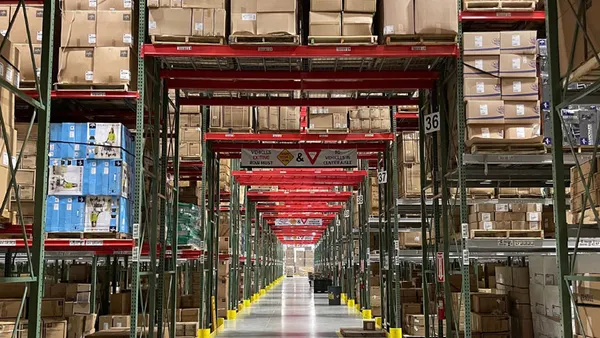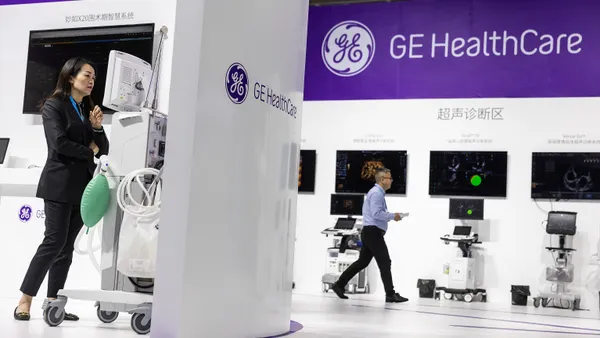Dive Brief:
- AbbVie on Tuesday announced it will acquire Allergan in a $63 billion deal, delivering a forceful answer to growing shareholder questions over AbbVie's future beyond its top-selling drug Humira. Combined, the companies would rank as one of the industry's largest by revenue.
- The cash-and-stock agreement, which values Allergan shares at a 45% premium to Monday's closing price, comes after several years of clinical setbacks and M&A missteps for the Ireland-based Allergan.
- AbbVie's overture comes less than four years after an attempt by Pfizer to merge with Allergan in a $160 billion deal that was called off after changes in U.S. tax rules. Since then, industry consolidation has gathered steam, most recently with Bristol-Myers Squibb's $74 billion takeover of Celgene.
Dive Insight:
Both AbbVie and Allergan faced growing shareholder pressure for more aggressive approaches to answer long-term questions on each company's future.
Yet AbbVie's planned $63 billion buyout of Allergan came as a surprise to some on Wall Street, and brings further change to an industry still digesting Bristol-Myers' deal for Celgene.
For AbbVie, shareholders have grown increasingly focused on what will drive the company forward beyond Humira (adalimumab), which accounts for more than 60% of its revenues and faces entry of low-cost copycats in the U.S. in 2023.
Buying Allergan gives a response to those worries, although sell-side analysts were skeptical of how well Allergan and AbbVie's respective businesses fit together. Clinical setbacks, meanwhile, have fueled questions of Allergan's strategy outside of medical aesthetics.
AbbVie's board began considering options to prepare for U.S. biosimilar competition to Humira slightly more than a year ago, AbbVie CEO Richard Gonzalez said on a conference call Tuesday. Options included linking together smaller acquisitions, pursuing one or two "bolt-on" deals, or making a bid for a larger takeover.
A so-called string-of-pearls approach would have increased R&D spending and subsequently lowered earnings, Gonzalez said, while a large bolt-on deal would come with concentrated risk around one clinical asset — something AbbVie knows well after the high-profile failure of a drug acquired in 2016 deal for Stemcentrx.
Once combined with Allergan, AbbVie expects Humira sales would represent less than 40% of the new company's total revenues.
Even then, the inflammatory disease drug would continue to be a crucial component of the combined company's business — particularly as its sales will be needed to pay down the $38 billion in financing AbbVie will draw on to buy Allergan.
Gonzalez made clear that the company was drawn toward Allergan's current business, not the pharma's R&D.
"We're not betting on the pipeline," Gonzalez said, noting that Allergan's assets add between $10 billion and $15 billion in "durable" revenue — sales that could offset declines from Humira.
"Essentially, Humira is buying the assets that will replace it in the long term," he added.
Allergan's largest contributions to the combined company are in medical aesthetics, where the pharma has built on the success of Botox (onabotulinumtoxinA), and in neuroscience.
Botox plays a large role in the latter category as well, earning roughly $2 billion last year from sales for uses in migraine, movement disorders and overactive bladder.
Per deal terms, Allergan shareholders will receive 0.866 shares in AbbVie along with $120.30 in cash for each share in Allergan. After closing, AbbVie investors would own 83% of the combined company.
Gonzalez will become CEO of the combined company, which will be based in North Chicago, Illinois and retain AbbVie's name. Allergan CEO Brent Saunders will join AbbVie's board.
A takeover of Allergan by AbbVie would further reshuffle the top ranks of pharma following Takeda's $63 billion buyout of Shire and Bristol-Myers' pending deal for Celgene.
Together, AbbVie and Allergan earned revenues of roughly $48 billion in 2018, about $20 billion of which come from sales of AbbVie's Humira (adalimumab). By AbbVie's counting, that figure would make it the fourth largest pharma in the industry after Johnson & Johnson, Roche and Pfizer.
Steady share price declines made Allergan a substantially cheaper target than when Pfizer courted the Irish pharma with a $160 billion merger deal in 2015. Since then, Allergan's stock has declined more than 50%, leading to mounting investor frustration and demands for action.
After Pfizer and Allergan dropped their merger plans, Allergan highlighted a group of pipeline assets it said would drive its future as an independent company.
Four years on, those drugs have largely failed to live up to company expectations, with several clinical trial setbacks and others facing stiff market competition.
Allergan has also taken substantial criticism for some of its legal practices. In particular, the pharma failed in its attempt to shield its top-selling dry eye drug Restasis from competition in an unusual licensing deal involving a Native American tribe.
Those struggles inspired further investor criticism of management, leading to proposals this year and last to split up Allergan's CEO and chairman roles, both currently held by Brent Saunders.
Although a majority of shareholders rejected an immediate separation, the chief executive vowed in May to respond to investor discontent with "decisive action" from the company.
Shares in AbbVie fell by more than 10% Tuesday morning, while Allergan's traded up by 27% to near $165 per share. That's below the total consideration of $188.24 per share in AbbVie's cash-and-stock offer, perhaps reflecting some concern over the deal's closing.
Investor pushback to Bristol-Myers' deal for Celgene added some drama to eventual shareholder votes in favor of the buyout, while the Federal Trade Commission recently required the pharma sell off Celgene's psoriasis drug Otezla (apremilast).
"We think investors are likely to take notice of the FTC's recent scrutiny of [Bristol-Myers'] acquisition of [Celgene], requiring the divestiture of Otezla, despite no existing commercial overlap," wrote Piper Jaffray's Tyler Van Buren in a Tuesday note to investors.
Laura Schumacher, AbbVie's chief legal officer, said the company doesn't expect significant issues with the FTC, but plans to divest a few, small products that overlap with Allergan.
AbbVie and Allergan expect their deal to close in early 2020.










